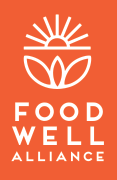Starting the year off right! Food Well Alliance’s newest grant recipients gather to identify shared success metrics before beginning their projects
/From start-up enterprises to established non-profit organizations, collecting data to measure outcomes for success can be daunting.
Last week, Food Well Alliance gathered passionate leaders from 14 organizations who received a 2017 Local Food Grant to help make this a little easier.
Bobbi de Winter, Food Well Alliance's Executive Director, kicked off the January 31 meeting by first acknowledging the accomplishments and work of these local food entrepreneurs.
“You are the movement because you are working to grow and strengthen Atlanta’s local food system,” she told the room full of local urban farmers, social enterprises and community-based organizations.
During the meeting, the group went one-by-one and each shared a success they experienced in the last year.
They were then joined by Grants and Community Capital Manager, Kim Karris, who shared more about the importance of measuring impact and sharing metrics of success.
“If we want to see major policy changes around urban agriculture, if we want to see increased investment in local production and distribution of healthy food, together we are going to have to prove that sustainably-grown, locally-produced food is improving our city’s health, wealth, community and ecology,” Kim said.
“The only way to do that,” she continued, “is by demonstrating our collective impact and by being diligent in capturing data that measures whether or not what we are doing as a movement is working.”
The goal for last week's meeting was for Food Well Alliance to learn how it can better serve and support the grant recipients, and for grant recipients to identify barriers to capturing those metrics to help ensure their success as they begin implementing their projects this year.
The group was joined by Bryan Noel, a Strategy and Evaluation Consultant, during the gathering who helped facilitate break-out sessions on ways to better capture data and measure success.
The 22 local food leaders gathered in the room were then separated into groups based on their impact areas, Economic Development and Health and Nutrition, in which they worked to define common success metrics and barriers for their similar work.
Some of the barriers recipients identified as a group included the amount of time it takes to measure impact, qualified staffing and relevant software to document data, as well as the complexity of measuring impact itself.
In order to provide meaningful and relevant support to grant recipients, Food Well Alliance will be connecting resources to address these barriers, so that at the end of their projects, the 2017 cohort will be able to better communicate their success as individual organizations and their shared impact as a movement.
Back in December, Food Well Alliance was delighted to announce the 14 recipients of the 2017 Local Food Grant.
The 2017 Local Food Grant was designed for farmers seeking infrastructure support to increase sustainable food production and economic viability in order to provide a portion of their local harvest for nearby programs serving low-access neighborhoods.
The grant was also intended to help organizations work collaboratively with local farmers to source fresh, nutritious food and improve health in low-income communities.
To learn more about the 2017 Local Food Grant recipients visit here, and to learn more about the Local Food Grant, click here.









